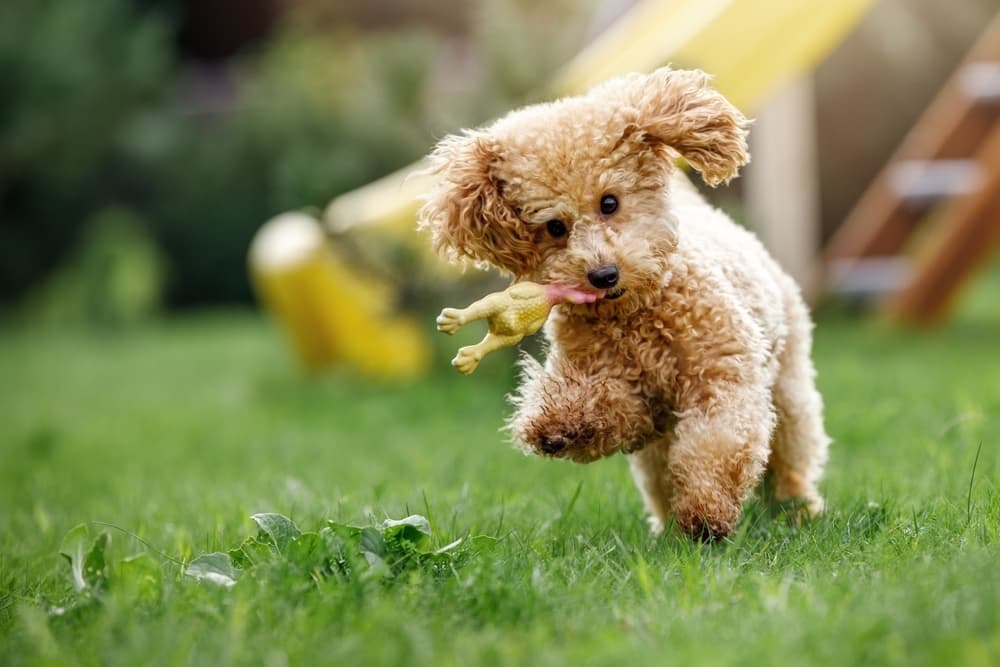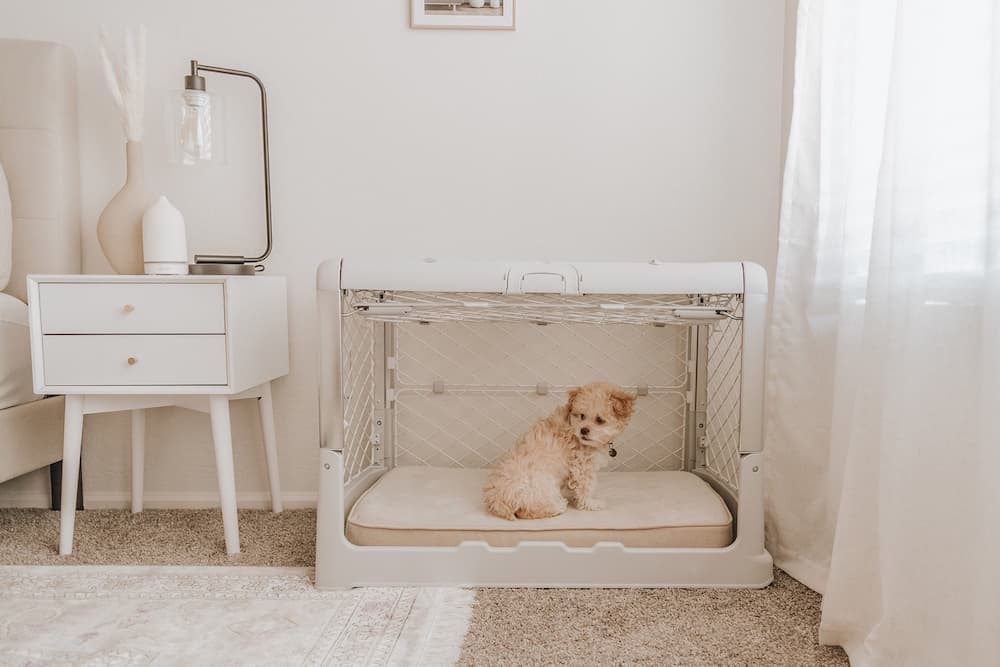When Do Puppies Calm Down?

When it comes to exerting energy, puppies are much like human children. Young dogs have a powerful sense of curiosity coupled with limitless energy and a penchant to test their boundaries. It’s a frenetic pace that can leave pet parents feeling frazzled and wondering: When do puppies calm down, exactly?
We have the intel on when you can start to expect some much-needed peace, followed up with tips on how to calm down a puppy. We also recommend asking your veterinarian for guidance specific to your dog.
Why Do Puppies Have So Much Energy?
It takes a lot of effort to learn how to be a dog. All that playing, running, chasing, exploring, biting, chewing, and interacting requires huge stores of energy, which puppies replenish when they sleep.
When puppies are younger, they’ll sleep for several hours, then follow up with a 20- to 30-minute high-energy play session, says Dr. Amber Karwacki, a partner doctor at Heart + Paw in Philadelphia. “As they get older these play sessions can get longer and it can seem like your puppy has boundless energy. This is because your puppy is exploring their world and seeing what they can do.”
Energy Levels Can Vary in Puppies
“Just like kids, puppies have different personalities, and that can contribute to energy level,” says Dr. Jerry Klein, chief veterinary officer for the American Kennel Club, based in New York City. That’s why it’s entirely possible to have a hyper puppy and a puppy that’s not quite as revved up within the same litter.
A dog’s breed type can also influence energy levels. Breeds that are usually more energetic in adulthood will display this trait as puppies, says Dr. Klein. “For example, Sporting or Terrier breeds may be more active than a Basset Hound, but that is to be expected.”
So while all healthy puppies are active, he adds, “As they mature physically and mentally, they should end up close to their description of their breed or type of dogs they are.”
When Do Puppies Calm Down?

Now that we’ve covered why puppies are so lively, let’s get to the question at hand: When do puppies start to calm down?
Generally, puppies start to calm down when they reach emotional maturity — around 1 year old. However, some dog breeds take longer to reach adulthood and emotional maturity. In those cases, puppies may not mellow out until they hit 18 months to 3 years old.
Age Can Play a Factor
“Some dogs are puppies for life, but they tend to settle down into their routine. Up until a year of age they are still rambunctious, just like children,” says Dr. Klein. As previously mentioned, it can take some dogs longer to reach emotional maturity.
Of course, the intensity of that energy will fluctuate during this period. Between 8 to 12 weeks, puppies are impressionable, learning about their environment, and forming strong bonds with their new human family.
At the 12-week mark, puppies typically reach pre-adolescence. They’re becoming increasingly independent and curious, and developing their social skills.
At around 4 to 6 months, adult teeth are starting to emerge, says Dr. Klein. “Teething puppies are usually the most destructive, and chewing usually lessens as they get their mature teeth.”
Adolescence begins between 6 to 12 months, which can last until the dog reaches emotional maturity. This is the period where a puppy’s energy levels is at its highest. Dogs are becoming more independent and exploring their environment. They begin testing their boundaries and are more likely to get into mischief. And like human teens, they get bored more easily.
In addition to age, there are a few other things that can factor into when puppies start to calm down.
A Dog’s Size and Breed Can Influence Energy Levels
Yes, the type of puppy you have can definitely play into how quickly or slowly they start to find their calm. For example, “Large breeds do tend to mature more slowly than small breeds,” says Dr. Klein.
Other high-energy breeds include the Boxer, a playful and powerful working dog that excels at being a guardian and has been used in police and rescue work. The Jack Russell Terrier is a highly active dog that requires a lot of human attention, exercise, and mental stimulation. And herding breeds like the Border Collie and Australian Shepherd Dog were bred to move cattle back and forth, a role requiring huge stores of energy.
While all healthy puppies are rambunctious to some degree, some breeds tend to be more laid back. These breeds include the Bulldog, Shih Tzu, Basset Hound, and Bichon Frise.
Regardless of the breed of puppy you adopt, keep in mind that dogs are individuals who may not fully live up to a standard.
A Dog’s Home Life is Critical to Raising a Calm Puppy
The amount and quality of exercise a dog gets can also determine whether they’ll be a calm puppy or hyper puppy.
Dogs who are allowed to run and burn off energy are apt to be calmer in the home, says Dr. Karwacki. “On the other hand, puppies that are not able to burn off their energy can become destructive and anxious.”
How to Help a Puppy Calm Down

There are things you can do to help your puppy settle down a bit. Check with your veterinarian or certified dog trainer before implementing any of our “how to calm down a puppy” tips, as well as with any concerns about your puppy’s behavior.
What may seem like normal puppy energy can actually indicate something more serious. For example, in a study of 11,000 dogs, researchers found that young male dogs who regularly spent more time alone displayed traits similar to those found in people with ADHD, such as hyperactivity, impulsivity, and inattention.
Start With Yourself
Patience is a virtue when it comes to raising puppies. “Puppies will eventually settle down into the companion you hoped they would be, with proper training, patience, and socialization,” says Dr. Klein.
It’s also important to have realistic expectations. “When we acquire a dog, we may have expectations based on the research we have done, but it takes time for a dog to grow into their mature selves, both physically and mentally,” he adds.
Provide Adequate Stimulation
It’s one of the most important things you can do to raise a healthy, calm puppy. “A bored dog is a disruptive dog, so you want to make sure and provide mental and physical stimulation,” says Dr. Klein. Puzzle and interactive toys are great options for keeping your puppy’s mind occupied.
To satisfy your pup’s physical requirements and help them burn excess energy, Dr. Karwacki recommends regular exercise in the form of walks, as well as play, either indoors or in your backyard. Also, “Depending on your dog, you can look for training classes or exercise classes like agility and herding to help with mental stimulation and exercise.”
Create a Den for Your Dog
Like many mammals, dogs enjoy dens. They provide security and a place to feel safe when they’re stressed. The definition of “den” may differ by individual dog. “Some dogs will like the den-like qualities of a crate, while others will prefer to lay on the couch. Once you know what type of environment your dog prefers, set up a space for them to settle down in,” says Dr. Karwacki.
Adding music to the mix can also help. In a study to determine the best genre of music to relieve stress in kennel dogs, researchers found soft rock and reggae to be the most effective.
Consider a Pheromone Product
Ask your veterinarian if a pheromone product (typically available as sprays, collars, and plug-in diffusers) is a good option. Veterinarians say a product called ADAPTIL works by mimicking the natural pheromones mothers emit. This could help puppies calm down while transitioning to their new home.
Help Your Puppy Through the Teething Process
To alleviate the increased chewing, biting, and destruction (and pain) associated with teething, make sure your dog has an adequate number of chew toys or offer special treats like a Kong filled with peanut butter.
Work with Certified Professionals
If you’re new at puppy parenthood, consider working with a certified dog trainer or behaviorist to help with training your puppy. This type of partnership can help ensure a smoother journey for you and your new family member.
Do Your Research
Before getting a puppy, it’s essential to understand the temperament of the breed you intend to bring home and prepare yourself for the challenge. “Make sure that you will be able to provide the exercise and mental stimulation your puppy will need before bringing them home,” says Dr. Karwacki. “This will help to prevent behavioral problems in the future and create a better bond between you and your dog.”









